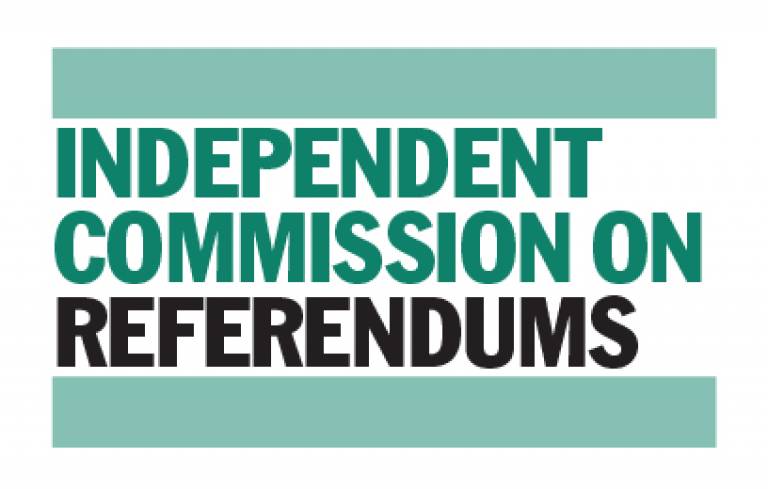First meeting of the Independent Commission on Referendums
16 October 2017

On Monday 16 October, the Independent Commission on Referendums meet for the first time to discuss the use and conduct of referendums in the UK. The Commission will meet over 8 months, take evidence, and produce a report and detailed recommendations in summer 2018.
The Commission, comprising 12 distinguished members (names below), has been established by the UCL Constitution Unit. Its members include two former cabinet-level ministers, four other current and former parliamentarians, the former Chair of the Electoral Commission and a former head of political programming at the BBC. Others are leaders in the fields of political theory, media standards and public opinion. The members represent a range of political opinions, with expertise extending across all major UK referendums of recent years.
The Commission seeks to address key concerns that were raised about last year's EU referendum and other recent referendums. These include who should be able to call referendums, and on what topics, how public funds can be used, and how to improve the quality of debate, minimising misinformation and divisive campaigning. It will look at five main areas:
- the place that referendums should play in the UK's system of representative democracy
- the legal effect of referendums and whether any additional constitutional safeguards are needed
- the role of government during the campaign
- the regulation of the designated campaign groups
- the provision of public information and education, and promotion of informed debate.
The Constitution Unit established the 1996 Commission on the Conduct of Referendums whose report was instrumental in bringing about the first UK regulation of referendums, through the Political Parties, Elections and Referendums Act 1998. The report of this new Independent Commission on Referendums is likewise set to inform policymakers and to shape future debate around referendums in the UK.
Gisela Stuart, member of the Commission and former Labour MP and Chair of Vote Leave said:
"The EU referendum highlighted important questions about the use of referendums that urgently need addressing. When is it appropriate to hold a referendum and for what purposes? How should a level playing field be ensured during the campaign? How should government prepare for the referendum outcome?
"The Independent Commission on Referendums, with its combined expertise, is very well placed to start the debate. I hope its work will be pivotal in improving the practice of future referendums in the UK."
Dominic Grieve MP, member of the Commission and former Conservative Attorney General said:
"With increasing frequency, referendums have been used in the UK to mandate important constitutional changes. Safeguarding our constitutional structures demands that they be conducted well. However, the UK still lacks generic rules for holding referendums, and the legislation regulating the conduct of campaigns, passed seventeen years ago, reflects the concerns of a pre-Internet age.
"The Independent Commission on Referendums will put forward practical recommendations to improve the practice of future referendums and strengthen UK democracy."
Jenny Watson, member of the Commission and former Chair of the Electoral Commission said:
"Referendums in the UK allow the public to be directly involved in some of the most important decisions about how we are governed; but effective regulation is essential to ensure that they are free, fair and democratic. The UK does very well in regulating some aspects of referendums, such as setting questions. In others - including the length of campaigns and the role of government during those campaigns - improvement is required.
"We can learn a lot from our own experiences in referendums since 2000 and from how referendums are conducted in other democracies. I look forward to contributing to the important and timely work of the Independent Commission."
Commission members
Sir Joseph Pilling KCB, Chair - former Permanent Secretary of the Northern Ireland Office.
The Rt Rev. the Lord Eames OM - Crossbench peer and former Anglican Archbishop of Armagh.
Rt Hon. Cheryl Gillan MP - Conservative MP and Secretary of State for Wales (2010-12) during the 2011 Welsh devolution referendum.
Rt Hon. Dominic Grieve QC MP - Conservative MP and former Attorney General (2010-14).
Sue Inglish - former Head of Political Programmes, Analysis, and Research at the BBC (2005-15).
Seema Malhotra MP - Labour MP and member of the House of Commons Exiting the European Union Committee.
Deborah Mattinson - co-founder of BritainThinks and former pollster to Gordon Brown.
Dr Martin Moore - Director of the Centre for the Study of Media, Communication and Power at King's College London and founding Director of the Media Standards Trust (2006 - 15).
Professor David Runciman - Professor of Politics at the University of Cambridge who has written widely on democracy and representation.
Rt Hon Gisela Stuart - former Labour MP and Chair of the Vote Leave campaign during the EU referendum.
Jenny Watson CBE - former Chair of the Electoral Commission (2009 - 16).
Andrew Wilson - former SNP MSP and Chair of the SNP Growth Commission
More details of the scope and membership of the Independent Commission on Referendums can be found on its website.
Join the discussion on Twitter: Constitution Unit: @ConUnit_UCL, Independent Commission on Referendums: @ICReferendums.
 Close
Close


